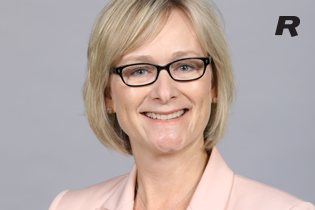 When her daughter moved out of the family home in Houston and headed off to the University of Toronto to start her undergraduate studies, Beth Hickey (EMBA ’19) promised to visit often.
When her daughter moved out of the family home in Houston and headed off to the University of Toronto to start her undergraduate studies, Beth Hickey (EMBA ’19) promised to visit often.
She certainly stuck to her word. Every two weeks, during her daughter’s first year, Hickey set off to the same campus where her daughter was studying to pursue her own studies.
“I wasn’t looking to follow her to school, but the timing worked out beautifully,” says Hickey, who will be graduating from the One-Year Executive MBA program in June.
Given her impressive professional record — she has over 20 years of experience working in the oil and gas industry and is currently a senior vice president at Energy Transfer, a US Fortune 500 energy midstream company — many might have been surprised by Hickey’s decision to return to the classroom.
“I saw the One-Year Executive MBA as an insurance policy for my career,” explains Hickey. “I knew this program would equip me with the right skills and tools to face any unexpected challenges or disruptions.”
Making the One-Year Executive MBA work for her
Over the past few years, going to business school had frequently been on Hickey’s mind. Though she would occasionally look up MBA programs online, she started to get serious when she saw her daughter apply to universities and colleges in her senior year of high school.
“I started to consider what might be next for me,” says Hickey. “It finally felt like the right time for me to go after this degree that I had been thinking about for so long.”
When Hickey sat down and looked at her options, the One-Year Executive MBA at Rotman made the most sense. She was impressed by the school’s strong reputation. Also, logistically, the one-year commitment and short flight from Houston to Toronto seemed manageable.
The challenging part, as it turned out, was keeping up with the studying and completing deliverables.
Even still, those challenging semesters would prove to be worth it.
Bringing the MBA lessons to work
When she set out to pursue the MBA, Hickey’s primary goal was to acquire a strong grasp of business fundamentals so that she could engage in discussions with more confidence and in more depth.
Today, having attended the classes and completed the bulk of the coursework for her Rotman program, Hickey has noticed the difference.
“Having the business fundamentals down has been extremely beneficial for my working relationships,” says Hickey, whose background is primarily in engineering, sales and marketing.
“I saw the One-Year Executive MBA as an insurance policy for my career.”
—Beth Hickey (EMBA ’19)
“I don’t shy away from conversations about technical business topics, such as accounting and finance, and I have a clearer view of the portfolio I oversee. In general, I feel better equipped to support my team.”
Hickey was pleasantly surprised to find how much she got out of her less-technical courses and how the lessons could be readily applied in the workplace.
“Many teachings really hit home,” she explains. “I saw how my job as a leader is to make sure people want to come to work. That means making sure every member on my team is informed, feels valued and wants to work.”
This thinking inspired her to institute regular quarterly town hall meetings, where she updates her team on the company’s performance. Now, she consciously devotes more time to building morale at work through social engagements, connecting with peers across the organization and promoting the contributions of her team members.
“I definitely saw my work differently and recognized how every day has to be about the team,” she said. “I feel like I’m doing a better job.”
The most important lesson: step outside your comfort zone
What’s the most valuable lesson that Hickey will take away from the executive MBA?
“Step outside your comfort zone,” she says without hesitation.
“I’m not a networker by nature, but so much of the MBA is about relationship-building. The classmates you work with and have dinner with after class will inevitably end up becoming a valuable part of your network.”
She also stresses how eye-opening these relationships can be.
“Many of us in the class have worked at the same organization or within the same industry for a very long time,” she says. “That’s why it’s so important to go outside your bubble and talk to people with different social and political and professional views. You’ll undoubtedly learn something about yourself in the process.”
Written by Rebecca Cheung | More Student Stories »